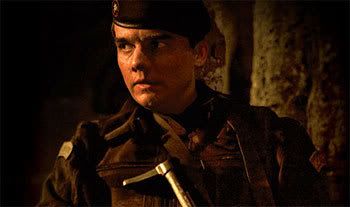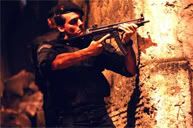Brazilian movie Elite Unit - Heroes or Anti-Heroes?

The recently released film "Tropa de Elite" (Elite Squad) has sparked unprecedented debate in Brazil about the role and actions of the security forces as they combat drug trafficking mafias in shantytowns.
While some regard it as an apologia for police brutality, others argue that the movie merely shows the reality of the fight against the drug trade, with its good and bad sides.
"Tropa de Elite", directed by José Padilha, explores the inner workings of the Rio de Janeiro Special Police Operations Battalion (BOPE), whose methods have frequently drawn fire from human rights groups.
More pirated versions of this film were in circulation than of any other movie in the history of Brazilian filmmaking, even before it was released in theatres on Oct. 5.
The story is told from the point of view of a member of the battalion, in his daily combat against drug traffickers in the "favelas" (shantytowns).
While it portrays the BOPE troops as knights in shining armour compared to the "corrupt" military police, it also shows them torturing detainees to extract confessions, and cold-bloodedly executing suspected drug traffickers in the favelas without a qualm.
It is precisely this straightforward and apparently uncritical approach which makes some people uncomfortable about the film. Arnaldo Bloch, a columnist for the newspaper O Globo, described its message as "fascist."
Bloch, who defied the initial wave of commendations for the movie’s cinematographic technique, said the film becomes a mouthpiece for the BOPE’s own vision of itself, portraying the characters as heroes, and justifying what he called, with irony, "minor slip-ups" like torture and summary executions.
What most disturbs human rights activists are reports of film audiences’ reactions. People applaud and cheer en masse at the scenes showing the execution of a trafficker, or torture.
Some shout "Caveirao!" (big skull), the name given in the favelas to the BOPE’s armoured patrol cars, which carry the battalion’s logo, a skull pierced by a dagger.
"The shouts of ‘Caveirao!’ and the cheers for scenes of torture do not surprise me. They fit the present concept of a war between ‘us’ and ‘them,’ at a time when many people are willing for any and every measure to be taken against their ‘enemies’," said Cano.
According to the sociologist, the BOPE symbolically represents the idea of the "incorruptible cop," the "warrior" who kills to defend his people.
"I think the BOPE is, in fact, less corrupt than the other forces, but it’s not squeaky-clean. They, too, get their financial rewards. For example, it costs more to hire a BOPE police officer for private security work than an ordinary policeman," he said.
BOPE members describe themselves as the most effective urban warriors in the world, and that appears to be the vision of them in the book that is the basis for the movie, Cano said.
"The book leaves room for the interpretation that they are heroes fighting on behalf of society. The ‘Rambo’ phenomenon, that vision that U.S. movies have of the guy who breaks the law in order to save society, is very similar," he said.
It portrays "going beyond the law itself to save society in an emergency situation," a focus that Cano would have preferred to be more clearly critical, rather than just a straightforward account.
"From a marketing point of view, it leaves the door open for the book to be read by everyone: those who support the brutality as well as those who criticise it," he pointed out.
But officials in the state of Rio de Janeiro do not share that view.
José Mário Beltrame, secretary of security, and Rio de Janeiro Governor Sérgio Cabral said the picture was "excellent." Cabral added that the film "faithfully portrays the public security problems we face."
 But the movie, which shows a police officer shooting a drug trafficker in the head, and suspects tortured to extract confessions, caused concern among some members of BOPE, who tried unsuccessfully to prevent it from being screened.
But the movie, which shows a police officer shooting a drug trafficker in the head, and suspects tortured to extract confessions, caused concern among some members of BOPE, who tried unsuccessfully to prevent it from being screened.Actor Wagner Moura, who plays the lead role as Captain Nascimento, was also concerned that some people in the audience look on his character as a hero.
"I wonder how a Swedish audience would react to this movie. I don’t think they would see those torturer policemen as heroes, any more than many people who have seen it here do," he said in an article he wrote for O Globo.
But Moura reacts angrily to critics who say the film is deliberately "fascist."
"In my opinion, ‘Tropa de Elite’ contributes to what’s most important at a time of crisis: open debate, the antithesis of fascism," he wrote.
Film critics, on the other hand, pointed a finger at the cosy relationship shown between drug traffickers and non-governmental organisations (NGOs) active in the favelas. These, according to the police in the movie, are guilty by omission or commission of being accessories to the criminals, as are the upper and middle classes for consuming drugs.
Human rights groups like Amnesty International often criticise the violent methods employed by BOPE when they drive into the favelas and shoot at innocent targets from their notorious caveiraos.

